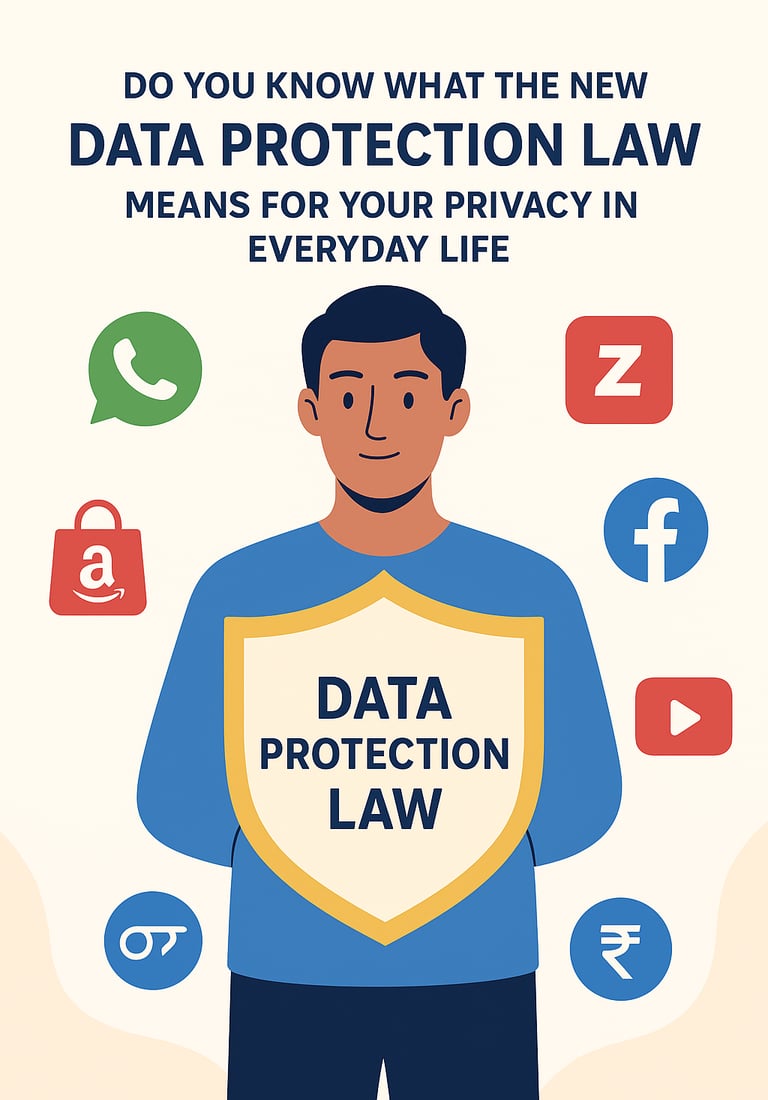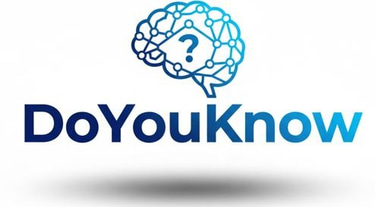Do You Know What India’s New Data Protection Law Means for Your Privacy in Everyday Life
Discover how India’s new data protection law impacts your daily digital life—from social media use to online shopping, banking, and workplace surveillance. A complete 2025 guide to data privacy, rights, compliance, and what it means for you.
TECH & SCIENCE
Do You Know Team
9/26/20254 min read


In an era where every click, swipe, and search leaves behind a trail of personal data, privacy has become one of the most critical issues of modern society. For Indians, the introduction of the Digital Personal Data Protection Act, 2023 (DPDP Act), which is being rolled out across 2024–2025, marks a historic shift in how individuals and organizations must handle personal information. This law is India’s version of what the European Union’s GDPR did for Europe—a comprehensive framework that ensures individuals regain control over their data in a rapidly digitizing world. But what does this mean for you as an ordinary citizen? Will it change how you use WhatsApp, Instagram, or Google Pay? Will it stop those spam calls from telemarketers? Will your workplace still monitor your emails and keystrokes? Will businesses like Amazon, Flipkart, Zomato, or your local startup now need to ask your consent differently before collecting your details?
This article explores all these questions in detail—breaking down the law, its key provisions, real-life examples, and most importantly, what it means for your privacy in everyday life.
1. The Rise of Data as the New Oil
We often hear the phrase: “Data is the new oil.” But what does it mean? Just like oil powered the industrial revolution, data powers the digital revolution. Every piece of data—from your Aadhaar number to your Netflix watchlist—is valuable. Companies analyze this data to predict consumer behavior, improve algorithms, and generate targeted advertisements.
Example: Have you ever searched for shoes online and then been bombarded with shoe ads on Facebook and Instagram? That’s data at work.
Example: When you order food from Swiggy, your location, preferences, and payment methods are stored to make future orders smoother—but also to send you offers.
This value, however, comes with risks—identity theft, financial fraud, surveillance, and misuse of sensitive information. That’s where the new law steps in.
2. Understanding the New Data Protection Law (DPDP Act, 2023-2025 Rollout)
The Digital Personal Data Protection Act is India’s first comprehensive law governing how personal data is collected, processed, stored, and shared. It brings India in line with global practices and builds a safer environment for users.
Key Features of the Law:
Consent First: No organization can use your data without your consent, except in specific government-notified cases.
Right to Access: You can demand to know what data companies have about you.
Right to Correct/Delete: You can correct inaccurate data or request deletion.
Children’s Privacy: Stricter rules for handling minors’ data.
Cross-Border Rules: Data can be stored globally but only in “trusted” countries.
Penalties: Fines of up to ₹250 crore for violations.
3. What This Law Means for You in Everyday Life
This is where the law comes alive—not in legal jargon, but in your day-to-day experiences.
a) Social Media (Instagram, Facebook, WhatsApp, YouTube)
Apps now need clear consent before tracking your behavior.
You’ll have more control over personalized ads.
If you delete your account, the company must erase your data (not just deactivate).
Children under 18 get stronger protections, reducing harmful exposure.
Impact Example: If your child is on YouTube Kids, the platform cannot target them with ads based on browsing history.
b) E-commerce (Amazon, Flipkart, Myntra, Zomato, Swiggy)
Your shopping history and personal preferences cannot be sold to third-party advertisers without consent.
Refunds and transactions will still require details, but beyond that, you decide what is shared.
Transparent “why we collect this data” pop-ups will become standard.
Impact Example: No more random spam emails from unknown brands just because you bought a shirt on Myntra.
c) Banking and Finance (UPI, Paytm, PhonePe, Credit Cards)
Stronger safeguards against phishing, loan fraud, and data leaks.
Banks must disclose how long they retain your KYC documents.
Payment apps cannot share transaction data with advertisers.
Impact Example: Your UPI app won’t be allowed to sell insights about your spending habits to third-party ad agencies.
d) Workplaces and Employees
Employers must inform you if they are monitoring your activities (emails, CCTV, attendance biometrics).
Consent becomes necessary for using personal data beyond official work purposes.
Impact Example: If your company wants to use your photograph for marketing material, they must ask permission.
e) Healthcare (Hospitals, Health Apps, Insurance)
Sensitive medical data (like prescriptions, test results) will have extra layers of protection.
Apps like Practo, 1mg, or HealthifyMe must clearly state why they collect your data.
Insurance companies cannot misuse your health data without your consent.
Impact Example: Your fitness tracker cannot sell your heart rate and sleep data to a health insurance company secretly.
4. Your New Rights Under the Law
The DPDP gives Indian citizens a “Bill of Rights” for Data.”
Right to Information – Ask companies what they know about you.
Right to Correction/Erasure – Fix or delete your data.
Right to Withdraw Consent – Stop services from using your data further.
Right to Nominate – Appoint someone to manage your data in case of death/incapacity.
5. Challenges and Criticisms
Government Exemptions: The law gives the government broad powers to bypass consent in cases of “national interest.” Critics say this could be misused for surveillance.
Awareness Gap: Many citizens may not know how to exercise their rights.
Small Business Burden: Startups may find compliance costly.
6. Global Comparisons
Europe’s GDPR: Stricter penalties (up to 4% of global revenue).
USA: No single federal law, but state-level laws like CCPA.
India: More flexible for businesses but still evolving.
7. Everyday Tips to Protect Your Data (Even With the Law in Place)
Read app permission requests before clicking “Allow.”
Use strong, unique passwords.
Regularly clear cookies and browsing history.
Use two-factor authentication for banking and social media.
Report data breaches if you suspect one.
FAQs
Q1: Will this law stop spam calls?
Yes, telemarketers must get your consent before calling. Violators can face heavy penalties.
Q2: What about WhatsApp messages?
WhatsApp must clearly explain how it uses your data. You can demand deletion of chat backups.
Q3: Can I ask Google or Facebook to delete my data?
Yes, you have the right to request complete erasure.
Q4: Is my Aadhaar data protected?
Yes, Aadhaar-linked data falls under sensitive personal data and gets higher protection.
Q5: Will this law impact small businesses?
Yes, even startups must comply, though the government may relax some requirements.
Conclusion
The new data protection law is not just about businesses and governments—it is about YOU. It empowers every Indian citizen to take back control of their digital identity in a world where data is both a currency and a vulnerability. From reducing spam to giving you rights over your digital footprints, the law will reshape India’s data economy. However, awareness is key. The law protects you only if you know your rights and actively exercise them.
As India moves towards becoming a $5 trillion digital-first economy, this law is a cornerstone of trust—ensuring that privacy and progress can go hand in hand.
#DataProtection #PrivacyLawIndia #DPDPAct #DigitalIndia #OnlinePrivacy #CyberSecurity #EverydayPrivacy #DoYouKnow
Knowledge
Empowering minds with reliable educational content daily.
Newsletter Signup
© 2025 DoYouKnow. All rights reserved.
Stay Ahead of the Trends – Join Our Newsletter
